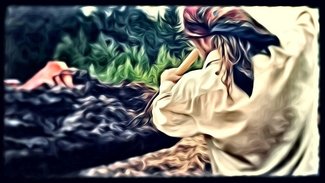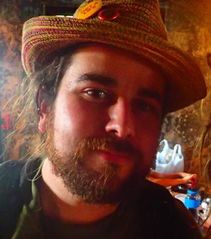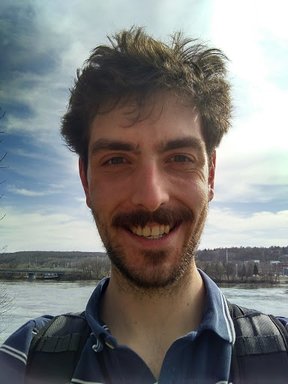Our facilitators come from a variety of backgrounds and educations ranging from professional academics to self learned enthusiasts.
TEACHERS
Alex Murray

Born in '81 this NB born beatboxing farmer has been a practicing permaculture enthusiast and identified food activist for nearly 10 years. Currently settled in Knowlesville to help establish the budding South Knowlesville Community Coop, Alex has started Ditch Rich Nurseries in response to the growing need for perennial fruit/berry producing plants in his broader community.
Stephan Fernette
Barrett Tinney

Barrett is looking to set a small example of off grid, alternative living in his home community of Huronia in Ontario. Drawing on their family acreage for the land, his partner and he plan on creating a bio diverse oasis that is regenerative and comes full circle in regards to his families, friends and hopefully, communities needs.
Through the Praxis Project he hopes to share his knowledge and experience (15+ years) on heavy machinery, while also gaining knowledge on permaculture principles to aid in his families dreams. Barrett has over 7 years business management skills, an onsite sewage treatment certificate (ON), septic system designer certificate and passionately advocates and works toward proper and safe water treatment, protection and respect throughout his career and both immediate and global communities.
Through the Praxis Project he hopes to share his knowledge and experience (15+ years) on heavy machinery, while also gaining knowledge on permaculture principles to aid in his families dreams. Barrett has over 7 years business management skills, an onsite sewage treatment certificate (ON), septic system designer certificate and passionately advocates and works toward proper and safe water treatment, protection and respect throughout his career and both immediate and global communities.
Simon Racine-Gauthier
Étienne Pélissier

I've been brewing beers for four years now. I've been guided on my first step by some more experienced friends, but almost all my knowledge is earned by self-teaching and discussion with amazing people. Last year I've been given a book, The Art Of Fermentation, and it blew my mind, almost everything I love to eat and drink are fermented food and since then I walk a path of discovery, pleasure and satisfaction.
Je brasse ma propre bière depuis maintenant 4 ans. J'ai été guidé dans mes premières tentatives par des amis plus expérimentés, mais presque l'entièreté de mes connaissances a été acquise en recherchant sur mes temps libres et en ayant des discussions avec des gens formidables. L'année dernière, je me suis fait donner un livre, The Art Of Fermentation, et j'ai été renversé d'apprendre que presque tout ce que j'aime manger ou boire est le résultat de fermentation, depuis je marche un chemin de découverte, plaisir et satisfaction.
By learning to produce and preserve our own food, we can walk a path toward self-sufficiency, but primarily, we can achieve community. The beautiful fact of brewing beer, Kampuchea or soda and preparing fermented food, be it cheese, fermented sausages, kimchi or sauerkraut, is that it is really hard to produce only a small amount. It is much more time efficient to make a large batch and there we end up with enough drinks to quench the thirst and fill the bellies of our friends and neighbors. These are skills that our ancestors were able to develop for millennia through family teaching, but are now reserve to specialist and industries. The formers wanting you to believe you have to go to specialised schools, and the latter's wanting you to think these techniques are inherently dangerous. But like everything in life, be it trying to fix your car or make your own yogurt, can end up in non-satisfactory results (yogurt on the walls) or dangerous ones (cutting your own brake line). That is why the first step should be finding experience teachers, grinding the lore of the craft and talking about it.
Je brasse ma propre bière depuis maintenant 4 ans. J'ai été guidé dans mes premières tentatives par des amis plus expérimentés, mais presque l'entièreté de mes connaissances a été acquise en recherchant sur mes temps libres et en ayant des discussions avec des gens formidables. L'année dernière, je me suis fait donner un livre, The Art Of Fermentation, et j'ai été renversé d'apprendre que presque tout ce que j'aime manger ou boire est le résultat de fermentation, depuis je marche un chemin de découverte, plaisir et satisfaction.
By learning to produce and preserve our own food, we can walk a path toward self-sufficiency, but primarily, we can achieve community. The beautiful fact of brewing beer, Kampuchea or soda and preparing fermented food, be it cheese, fermented sausages, kimchi or sauerkraut, is that it is really hard to produce only a small amount. It is much more time efficient to make a large batch and there we end up with enough drinks to quench the thirst and fill the bellies of our friends and neighbors. These are skills that our ancestors were able to develop for millennia through family teaching, but are now reserve to specialist and industries. The formers wanting you to believe you have to go to specialised schools, and the latter's wanting you to think these techniques are inherently dangerous. But like everything in life, be it trying to fix your car or make your own yogurt, can end up in non-satisfactory results (yogurt on the walls) or dangerous ones (cutting your own brake line). That is why the first step should be finding experience teachers, grinding the lore of the craft and talking about it.